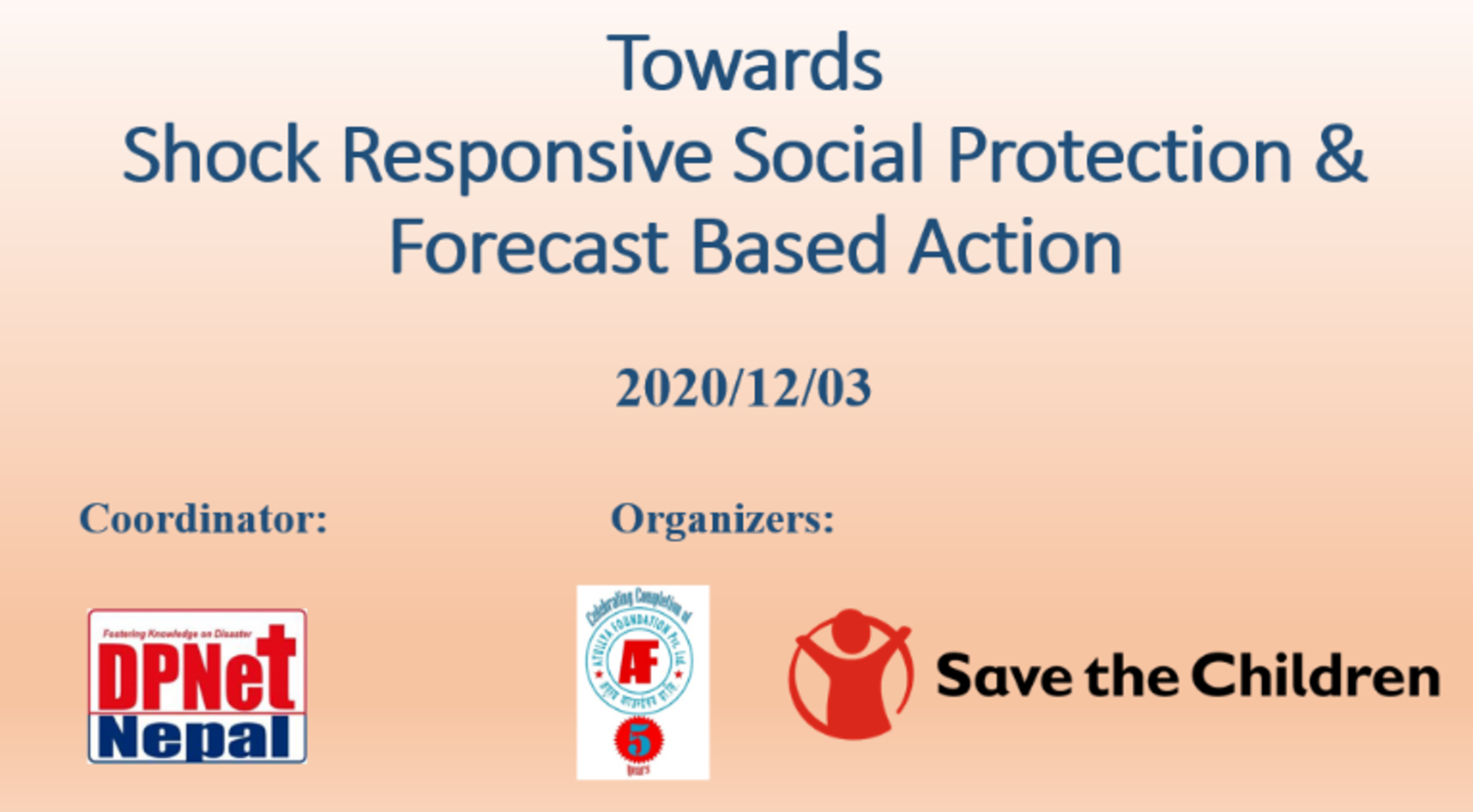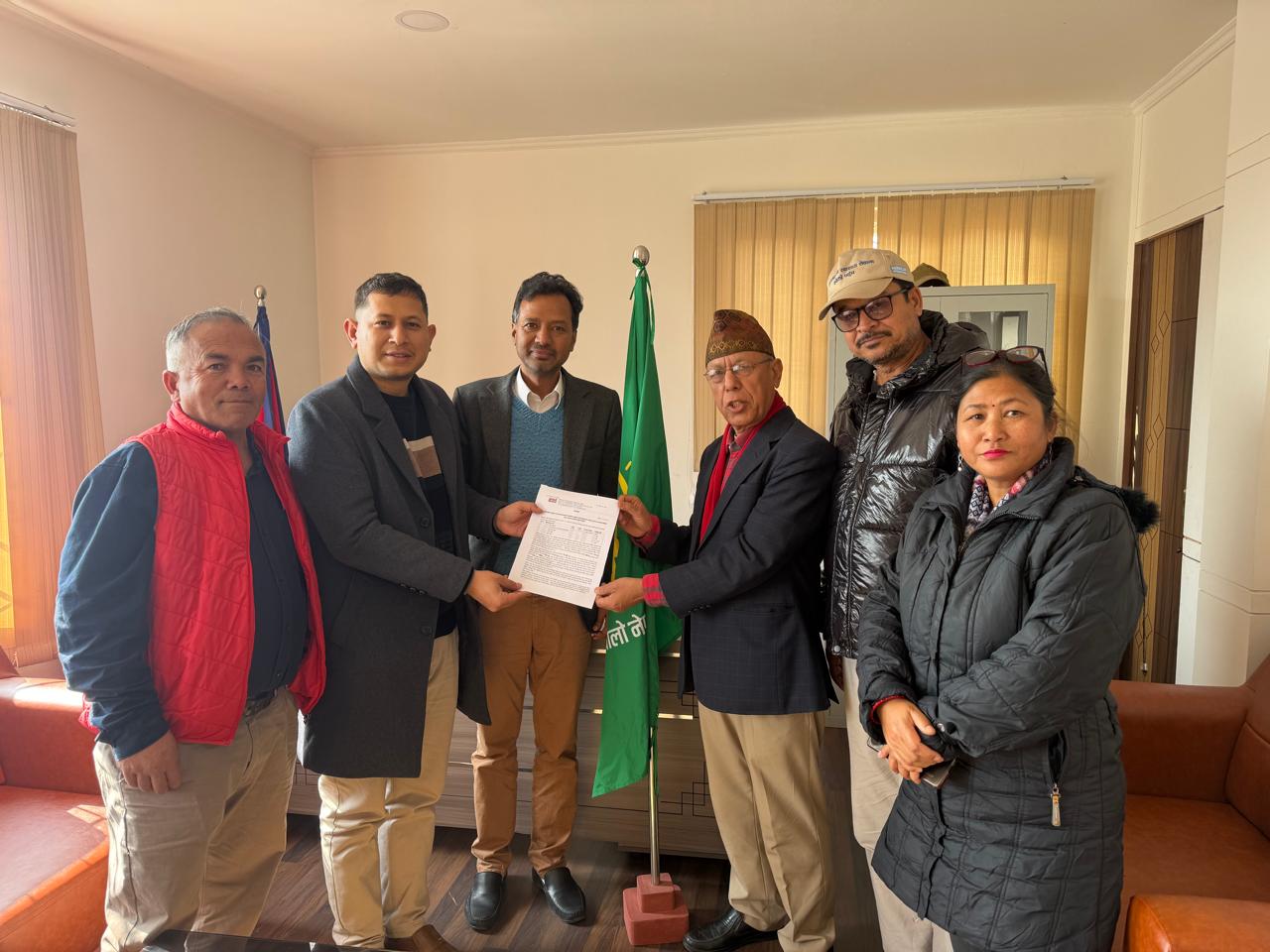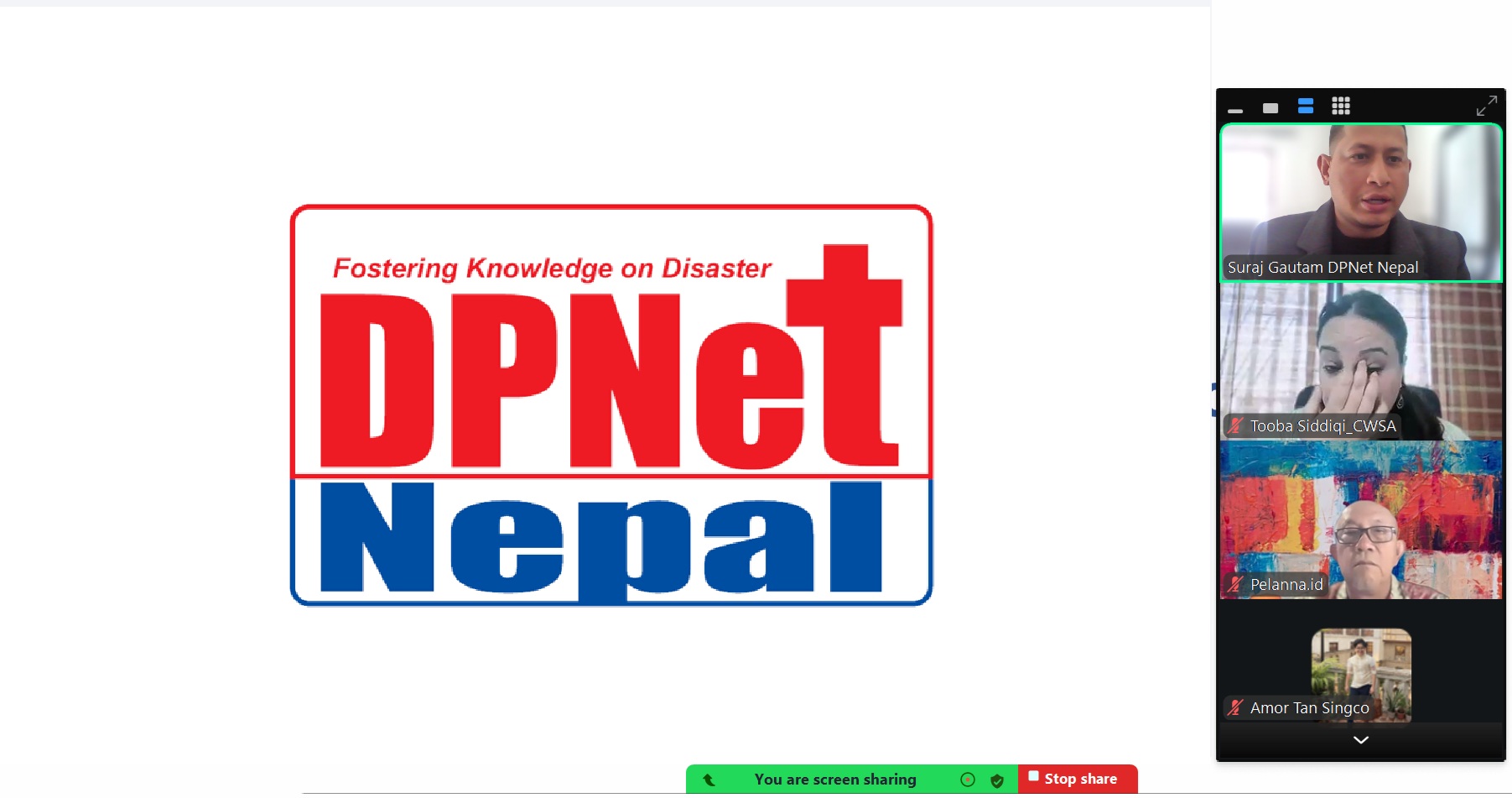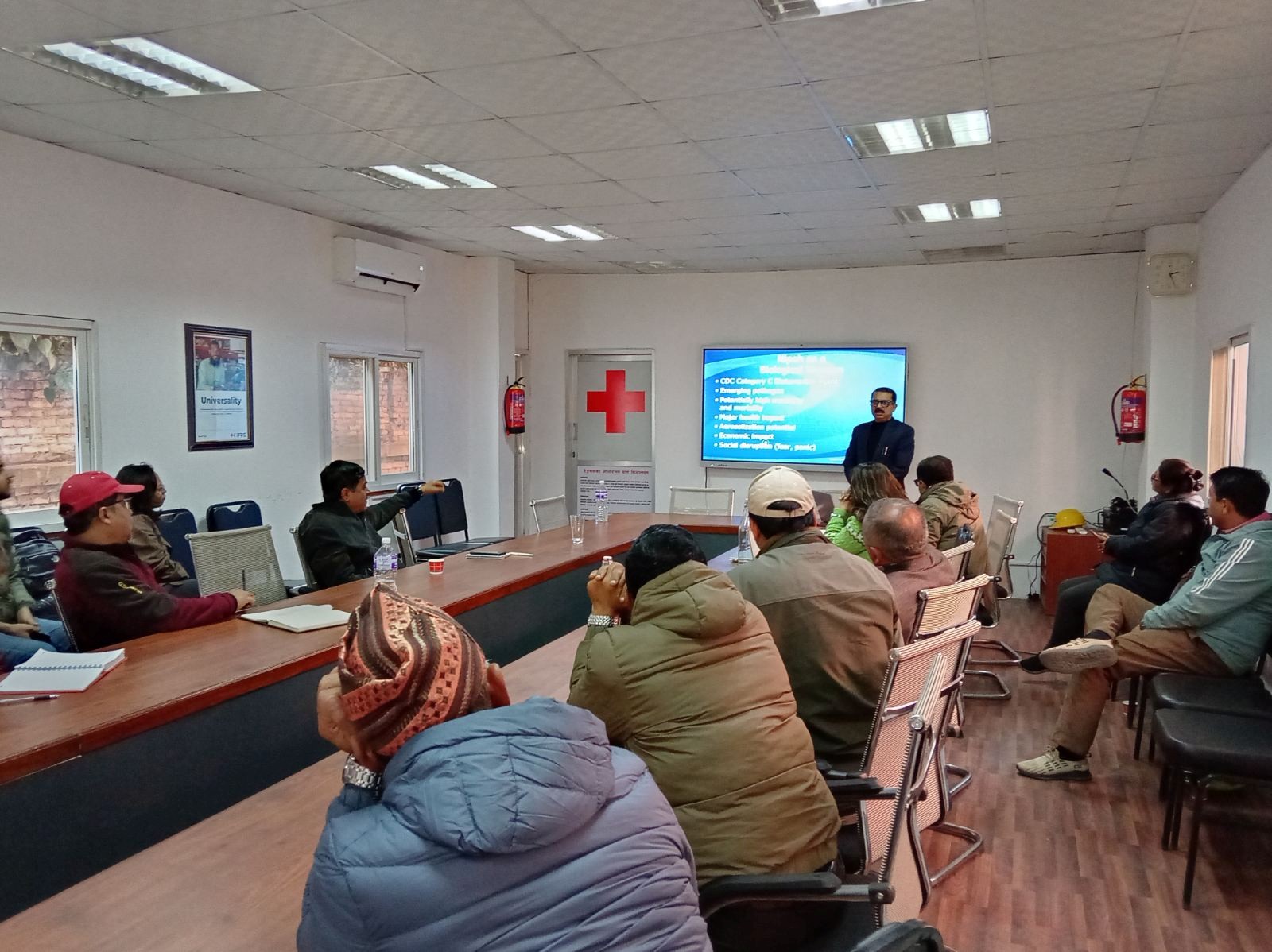Towards shock responsive social protection and forecast based action/financing

Towards shock responsive social protection and forecast based action/financing
A virtual discussion program entitled "Towards shock responsive social protection and forecast based action/financing" was coordinated by DPNet-Nepal and organized by Atullya Foundation and Save the Children on 3rd December 2020. Mr. Surya Bahadur Thapa briefly introduced the program and welcomed all participants. Altogether 71 participants joined the program.
Major Highlight
Mr. Bishnu Kharel from Save the Children thanked DPNet-Nepal for taking the dialogues on Shock Responsive Social Protection (SRSP) and Forecast Based Financing/Action (FBF/A) and introduced SRSP and FBF/A. Furthermore, he shared the objectives of the program was i) to sensitize and create awareness amongst the relevant stakeholders about the need for shock responsive social protection (SRSP) as an approach that builds on the existing system for effective response through investing in an adequate level of preparedness, ii) to share key challenges and experiences of different stakeholders while implementing the SRSP and FBA and iii) to advocate with Government of Nepal, donors, and relevant stakeholders to create an enabling environment to move ahead on SRSP for pilot and generate evidence about its effectiveness. He added that the SRSP and FBF/A are needed to find ways to minimize risk linking our response efforts with an existing social protection mechanism. This can be done only if we can make the existing social protection system shock responsive. He cited the example of recent floods in Terai, where the lack of timely and accurate information about the vulnerable people during emergency response created a delay in response. He also stated that though we have a massive SP database, this database has not been used during emergency response. In most of the cases, our relief support has been in the form of in-kind distribution even though there are ample possibilities of cash transfer – as the GoN has done in the 2008 Koshi Flood response and 2015 Earthquake response. He further added that as of April 17th, 2020, more than 133 countries had planned, introduced, or adapted at least 564 social protection and jobs measures in response to COVID-19. He also shared some steps to follow to support shock-responsive social protection in response to disasters including COVID-19.
Mr. Panna Maharjan from WFP shared the presentation "Forecast Based Anticipatory Action Experience Sharing from WFP/FBF". His presentation included the data and information that in the last 9 years Nepal has lost 151 million $ due to flooding, 1478 flood events since 2011, 1 in 29 Nepalese are exposed to flood risk. He further added that anticipatory action for flood responses included robust forecasting and decision making framework-established action plan-pre arranged to finance. He shared about the WFP's FBF approach in Nepal operating in 19 flood-prone districts focusing on risk analysis, flood forecasting, standard operating procedures, and cash-based transfers. Discussion with stakeholders for cash-based transfers, the process of installation of a warehouse for NFRI's, process of cash-based transfer in three palikas of two district, and organizing dialogue platform.
Ms. Anne-Sophie Petri from the Danish Red Cross presented the "Overview of Anticipation and Possible Linkages with SRSP". She started her presentation with a short introductory video on forecast-based financing. Her presentation included the key take away anticipation is the capacity to better predict the probability of extreme weather events, an opportunity to take action to reduce their impact. The need to act in anticipation to introduce innovation in DRM cycle, to identify a population at risk since most of the climate-related hazards can be predicted, and early action focusing on reducing the impact. She also shared the experience of FBF in Nepal about the pilot project, feasibility study, and simulation in Bardiya district. She concluded her presentation with the way forward i) to establish a close collaboration among various stakeholders alongside the Government of Nepal to develop a community of practice/common approaches, bring experiences from the ground up, tested through simulations (if not triggered), ii) to contribute to initiatives/discussions and iii) to document each step of the process, what works or does not work, and share consolidated learnings to explore further opportunities to build a scalable mechanism.
Mr. Thakur Dhakal from UNICEF presented "A Roadmap for Shock Responsive Social Protection in Nepal". His presentation included the case for cash in emergencies-global evidence and trends, the proportion of humanitarian assistance delivered as cash which shows the increasing trend of cash and voucher assistance in comparison to 2004, 2014, and 2017. The proportion of humanitarian assistance delivered as cash in Nepal in 2015 which shows 15% of the assistance is based on cash and voucher. He also shared about the pre-conditions for cash, advantages of cash for maintaining dignity, efficiency, multiplier effect and speed, myths, and misconceptions. His presentation also included the key concept and issues, definition, the need to focus on SRSP, and key principles of SRSP. Specific types of social protection response focusing on social insurance, social assistance, care services, active labor market programs. Furthermore, he shared about Nepal's Special Protection System where we are now? and where we want to go? Basic elements of SRSP and way forward. As a final note, his presentation included a message stated as Shock-responsive social protection or cash in an emergency does not mean it will be sufficient to meet the needs of all households who need assistance, coordination with other interventions is essential.
Ms. Kopila Rijal, GESI/GBV Specialist presented about the "GESI in SRSP and FBF/A". Her presentation included the identification of key GESI roles, the definition of GESI, SRSP and FBA, GESI norms in SRSB and FBF IDPG Framework focusing on legal rights, policies, cultural norms, etc. She also shared the examples of using the GESI lens and setting the GESI/social protection priority area focusing on maternal and child cash transfer, disability allowance, social pension, vocational training etc. She also outlined the SRSP process with reference to the GESI/Social Protection based on IPWTG Framework and GESI based FBF emphasizing on assessing risks & impacts, identify capacity gaps, agree on starting point, develop anticipatory actions and data and evidence based advocacy and emergency response.
Mr. Tillotam Paudel, Chairperson of Social Protection Civil Society Network presented the "Civil Society Organization’s role to materialize the concept of Shock Responsive Social Protection and Forecast Based Financing/Actions in Nepalese Government". His presentation included the introduction of a network, major work of the network in 2020, highlighting the capacity building of CSO's in the areas of social protection, recommendations provided on national social protection framework, advocacy works, etc. SPCSN’s future plan to continue the capacity building of CSOs and advocacy works related to different areas of social protection, study/research, publish a social protection journal, develop SPCSN as a resource center for social protection etc.
Major Concerns
- Can you please give some examples of the GESI component in SRSP in the EWS framework?
- Do we have the competitive and comparative advantage to work on FBF/A and SRSP as often technical skills in PNGO is lacking and it's business as usual which we want to avoid lots need to be done and would have been good to have DHM in the meeting?
- How do you onboard the Social protection actors? any example of the project intervention that leveraging the SP system? Please also highlight policy level gaps on SRSP.
Respective presenters tried to address these querries.
Closing
Mr. Raju Thapa, General Secretary of DPNet informed that DPNet as an umbrella organization of various NGOs and INGOs working in the field of disaster management gives high priority to the new innovative practice and debate as a part of its knowledge management component. Mr. Thapa thanked all participants, presenters, for their time and closed the program. The video of the program can be found in you tube link https://youtu.be/N1X-O4n7n2U











